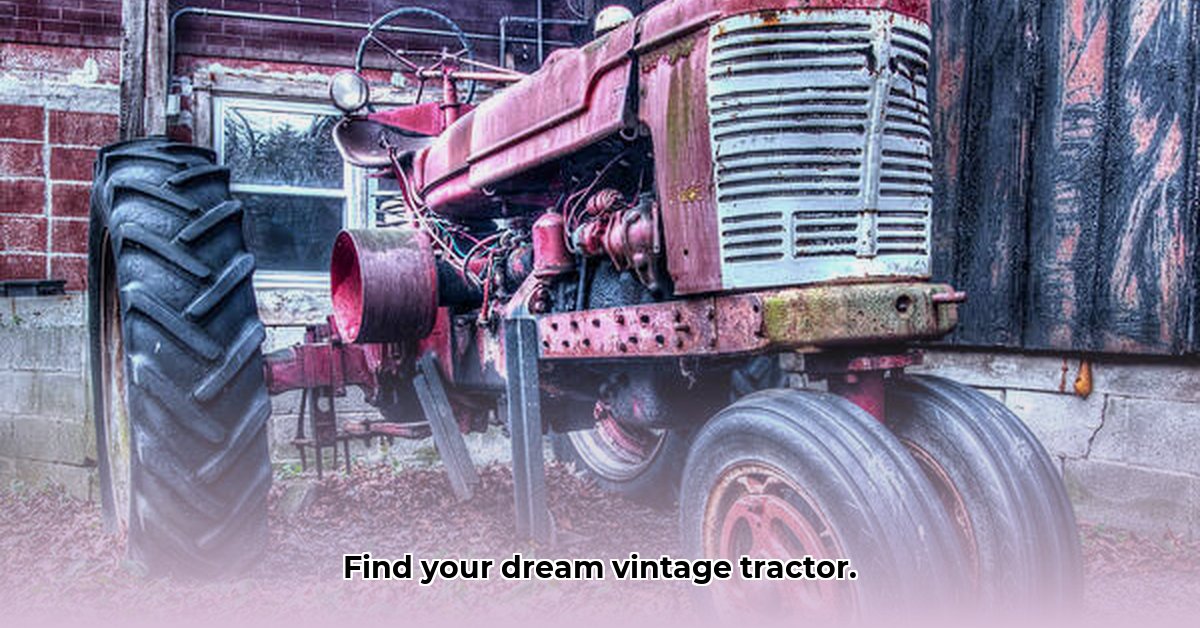
Finding the right antique farm tractor can be an exciting journey, blending history, restoration, and practical utility. This buyer's guide provides the essential information to navigate the market confidently, ensuring you find the perfect fit for your needs and budget. For more resources, check out this helpful vintage tractor website.
Types of Antique Tractors: Choosing Your Workhorse
Antique tractors aren't a one-size-fits-all proposition. The variety is vast, determined by size, horsepower, intended use, and brand. Understanding these categories is the first step to making an informed decision.
- Lawn and Garden Tractors: Compact and maneuverable, ideal for small properties and light tasks like mowing and tilling.
- Utility/Farm Tractors: More powerful than lawn tractors, suitable for a wider range of farm tasks, including plowing, haying, and light-duty fieldwork.
- Row Crop Tractors: These are the heavyweights, designed for large-scale farming operations, boasting significant horsepower and powerful PTO (power take-off) capabilities.
Popular brands include John Deere, Ford, International Harvester, and Massey Ferguson—each with unique characteristics and a dedicated following. Researching specific models within these brands will help you understand their capabilities and historical significance. Consider what tasks the tractor will perform—this will significantly narrow your search.
Before You Buy: Essential Factors to Consider
Before making a purchase, assessing various critical factors is essential to ensure a smooth ownership journey. These points are crucial to avoiding costly mistakes later:
Mechanical Condition: The Foundation of a Successful Purchase: A thorough pre-purchase inspection by a qualified mechanic specializing in antique tractors is non-negotiable. This will identify potential mechanical issues, estimate restoration costs, and uncover any hidden problems. A well-maintained tractor is a joy to own; a neglected one can become a financial drain. Don't skip this step!
Horsepower (HP) and PTO (Power Take-Off) Power: Understanding the Difference: Horsepower reflects the engine's raw power, while PTO power represents the usable power for implements. Drivetrain losses reduce engine HP to PTO HP; the exact amount varies. "While engine HP gives you movement, PTO HP lets you get the work done," explains John Smith, Senior Mechanic at Tractor Restoration Specialists. Ensure both are sufficient for your intended tasks. Don’t underestimate this crucial aspect!
Functionality: Matching the Tractor to Your Needs: Consider the tractor's capabilities in relation to your projects. Does it have a three-point hitch (a common attachment system for implements)? Is the hydraulic power adequate? Check for compatibility with the implements you plan to use. Matching the tractor’s functionality to your specific needs is paramount.
Technological Integration: Modernizing an Antique (Optional): Adding modern technology like GPS or improved lighting is possible, but it can be expensive and complex. Assess the feasibility and cost before pursuing such upgrades. Such modifications might also impact the tractor's original character and potentially void any existing warranties.
Pricing and Market Trends: Researching Fair Value: Prices for antique tractors vary widely. Online auction sites, specialized forums, and classified ads provide valuable price data. Remember that condition heavily influences value; a well-maintained tractor commands a significantly higher price than one needing considerable restoration. Thorough research is key.
Legal Considerations: Staying on the Right Side of the Law: Familiarize yourself with local regulations regarding antique tractor operation and restoration. This includes emissions standards, roadworthiness requirements, and any restrictions on the use of certain implements. Ignoring these regulations could lead to significant legal issues.
Where to Find Your Dream Tractor: Exploring Your Options
Several avenues exist for finding your dream antique tractor. Each has its advantages and disadvantages:
- Online Marketplaces: Websites like eBay and specialized agricultural equipment marketplaces offer a diverse selection, usually with detailed descriptions and images.
- Auctions: Online and live auctions can present excellent deals, but thorough research is vital to avoid overpaying. Competition can be fierce.
- Private Sellers: Buying from a private owner may offer better deals, but a careful inspection and thorough questioning are essential. Always secure all agreements in writing.
Regardless of your chosen source, always, always conduct a thorough pre-purchase inspection. This is the most important step to avoid costly mistakes.
Restoration and Maintenance: Preserving Your Investment
Owning an antique tractor requires commitment to ongoing maintenance. Regular servicing, including oil changes, fluid checks, and cleaning are essential. Addressing minor issues promptly will prevent larger, more expensive repairs later. For those not mechanically inclined, seeking help from experienced mechanics or restoration specialists is highly recommended. Online forums specialize in these topics, offering insights and advice from experienced owners.
A Final Note: Embrace the Journey
Finding the perfect antique farm tractor is not merely a transaction; it’s a journey. By carefully considering the points outlined in this guide, you can confidently navigate the market, find your dream machine, and enjoy the rewards of owning and maintaining a piece of agricultural history.